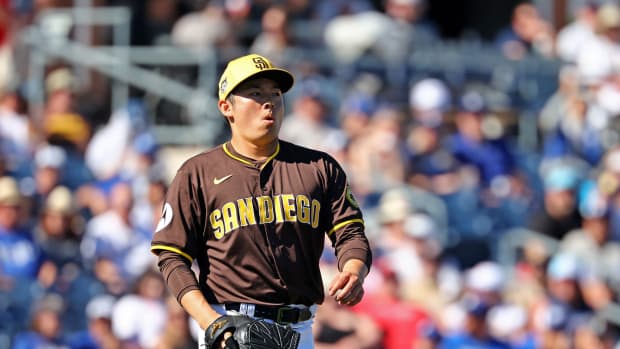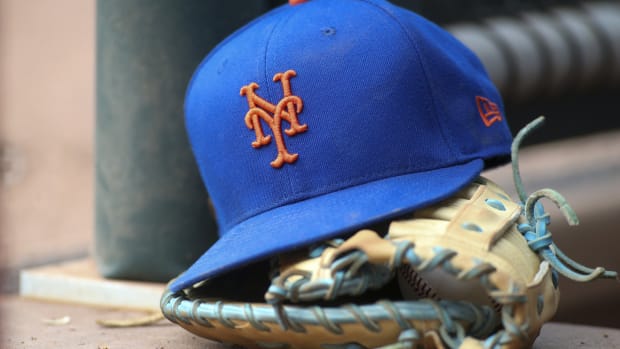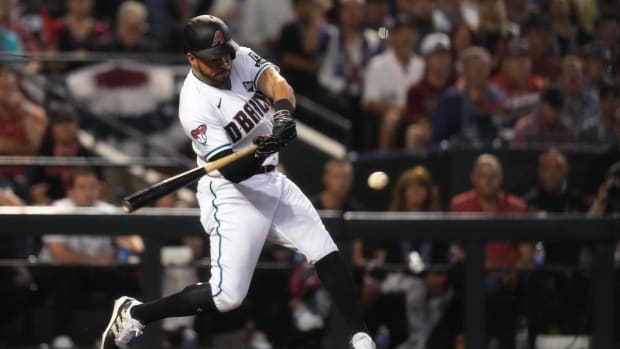
Retirement looms for Mariano Rivera after 2013
Mariano Rivera finished top-5 in Cy Young voting five times. He didn't start a game after 1995. [Al Bello/Getty]
You have reached your limit of 4 premium articles
Register your email to get 1 more
By Jay Jaffe
The greatest closer of all time is closing it down after the 2013 season. The Yankees have called a press conference for 10 AM Eastern on Saturday at George M. Steinbrenner Field in Tampa, Florida, and while their press release didn't explain why, multiple media outlets have reported that Mariano Rivera will use the occasion to announce his retirement. It's no surprise given Rivera's age (43) or his decision to return for one more season after a torn anterior cruciate ligament put him out of action from May 3 onward last year, but it will mark the end of an era just the same.
Rivera holds the all-time record for saves with 608, and his 2.21 ERA and 206 ERA+ are both records for post-Deadball Era pitchers with at least 1,000 innings as well. A late bloomer who wasn't signed out of his native Panama until age 20 in 1990, his progress to the majors was further slowed by elbow surgery in August 1992 (though contrary to popular belief it was not Tommy John surgery). He debuted in the majors in May 23, 1995 as a starting pitcher, and it wasn't until he was knocked around in 10 turns before he found a home in the bullpen, where he could rely almost exclusively on a cut fastball that has become his signature pitch.
By the time the playoffs rolled around in 1995, Rivera had emerged as a stifling setup man, and the next year he helped the Yankees win their first world championship since 1978 with 107 2/3 innings of 2.09 ERA ball in front of closer John Wetteland. He assumed closer duties in 1997 and except for the occasional trip to the disabled list, has held the job ever since. In his 18 major league seasons, he has earned All-Star honors 12 times, and placed in the top three in the AL Cy Young voting four times, including runner-up to Bartolo Colon in 2005.
As remarkable as Rivera has been in the regular season — the title "Greatest of All Time" barely suffices — he has been even better in the postseason, with a 0.70 ERA in 141 innings, the equivalent of two seasons. Those numbers give him a reasonable claim as the greatest postseason performer of all time, or at the very least of the wild card era (1995 onward), which has brought him and the Yankees opportunities to win on a perennial basis. They've reached the playoffs in every year during his career save for 2008, and with his help, they've won seven pennants and five world championships. For the last four of those (1998, 1999, 2000, and 2009), Rivera has been the last man standing on the mound, cool enough to keep his head while others around him were losing theirs.
Key among Rivera's claims with regards to both the regular season and the postseason has been his ability to escape the modern-day closer pigeonhole by pitching for longer than an inning. Aided by the willingness of managers Joe Torre and Joe Girardi to take advantage of his skills, he's gotten four outs or more in 116 of his 608 regular season saves, more than the next two pitchers on the list during that span — Keith Foulke (55) and Danny Graves (49) — and over two-and-a-half times the total of Trevor Hoffman (46), the man whose saves record he broke in late 2011. For the 1997-2011 span (in other words, his full seasons as closer), he averaged 7.5 long saves per year, and when he did, he pitched to a remarkable 0.78 ERA with just two homers allowed in 173.2 innings. In October, 31 of Rivera's 42 postseason saves have been of four outs or more, with a 0.34 ERA in 52 2/3 innings in those games. Three of the five relievers currently in the Hall of Fame — Goose Gossage (seven), Rollie Fingers and Dennis Eckersley (six apiece) — are directly below him on the list, with a combined 19 long saves in 35 1/3 innings between them.
Having been fortunate enough to watch and root for Rivera on a timeline that almost exactly coincides with his career (I moved to New York in February 1995, attended my first game at Yankee Stadium that summer, and became a partial season-ticket holder in 1998), what strikes me as remarkable even beyond the superlative numbers is Rivera's resiliency, his ability to rebound from adversity. In 1997, his first year as closer, he served up an eighth-inning solo homer to the Indians' Sandy Alomar Jr. in Game Four of the AL Division Series. Had he gotten five more outs, the Yankees would have closed out the series and advanced. His failure forced a Game Five, which the Yankees narrowly lost. Smarting from that defeat, both Rivera and the team came back stronger than ever the next year, winning the first of four straight pennants and three straight world championships.
They would have had a fourth straight championship had Rivera not faltered again. In 2001, once attention shifted back to baseball in the wake of the September 11 tragedy, he was on the mound in the ninth inning of Game 7 of the World Series against the Diamondbacks, protecting a one-run lead. Keyed by his own throwing error, made while attempting to force the runner at second base, he allowed two runs and the title went to Arizona instead. Yet Rivera climbed off the mat and continued to excel amid highs (including his three innings in Game 7 of the 2003 ALCS against the Red Sox) and lows (his two blown saves in the 2004 ALCS rematch, not to mention the latter-day annual What's Wrong With Mariano Weeks if he dared string together two subpar outings in a row). He was just shy of his 40th birthday when he closed out the 2009 World Series, and save for the knee injury, hasn't pitched appreciably worse since then, with a 1.87 ERA and even better walk and homer rates than his career marks.
Rafael Soriano






























![Mariano Rivera finished top-5 in Cy Young voting five times even though he never started a game after 1995. [Al Bello/Getty Images]](https://www.si.com/.image/c_limit%2Ccs_srgb%2Cfl_progressive%2Cq_auto:good%2Cw_700/MTY4MjU5MzUxODMyMTEwOTc3/image-placeholder-title.jpg)




